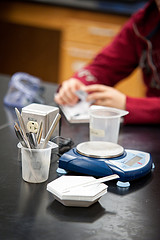The way it's supposed to be…
By Mary Bigelow
Posted on 2014-12-10
 I have been trying to incorporate more inquiry-based investigations into my biology curriculum. But the students are upset. They want to stick with the cookbook labs where they follow the procedure and complete a data table that I give them.
I have been trying to incorporate more inquiry-based investigations into my biology curriculum. But the students are upset. They want to stick with the cookbook labs where they follow the procedure and complete a data table that I give them.
—T., Colorado
It seems like you’ve noticed how high school students (and some of their parents) have definite ideas of how schools and classes should operate. If you deviate, you get pushback that can range from dirty looks to complaints to outright defiance. Even what may appear to be small changes such as an updated cafeteria menu, a different bell schedule, or a new classroom routine can set off this pushback.
If we try a new strategy once and it doesn’t fit the modus operandi, the students may assume that if they fuss or refuse, we’ll say “Well, that didn’t work” and classroom life will return to the-way-things-are-supposed-to-be. This certainly happened to me when I tried a different instructional strategy, an alternative form of assessment, or a new classroom management routine. Students would roll their eyes or complain before we even started.
We are such creatures of habit! By the time students are in the upper elementary grades, they have a definite idea of what school is “supposed to be.” Whenever teachers or administrators deviate from this comfort zone, the defenses go up.
This is true in other subject areas, too. I read an article about a French IV teacher who wanted to focus on conversations and authentic activities (all in French) instead of the traditional emphasis on grammar and vocabulary. Sounds good, right? But her students (mostly seniors) were outraged. She had changed the rules! These students were taking AP and other advanced level courses, and they saw the traditional French class as an easy A while they concentrated on their “real” courses. They knew they were good at memorizing and test-taking, but this conversation thing was a challenge that would require a different kind of effort.
The literature has discussions of how “inquiry” is actually a continuum of students assuming more responsibility for their investigations. In all fairness to the students, it might be overwhelming for them to leap from the comfort zone of cookbook labs to full inquiry in which they are assigned to formulate a question, design the procedure, and conduct the investigation. How have you approached this transition? If this is uncharted territory for the students, they will need to see examples of researchable questions, develop a repertoire of lab skills, and learn appropriate ways to organize and display their data. This is where you use your skills as a teacher to model and provide feedback. (See the blog From Cookbook to Inquiry for a description of an inquiry continuum and a link to an NSTA resource collection on the topic.)
Your question also made me think about how will students adapt to the performance expectations of the Next Generation Science Standards (NGSS). How will they apply the core ideas, make connections with the cross-cutting concepts, and incorporate scientific practices? If the NGSS performance expectations are drastically different from activities and assessments in their current science classes, what can we do to help students adapt to the changes, as we adapt to them ourselves?
If we know something is the right thing to do, a research base is behind it, and it will ultimately pay off in better learning or a better classroom environment, we should stick with it and explain why we are doing something new or different. The task should be divided into manageable steps. We may need to model the activity or strategy frequently. We need to give students time to adapt, keep at it, and continue to provide guidance, support, and encouragement as they move through the inquiry continuum. When students see the value, what was once a new idea becomes part of the-way-things-are-supposed-to-be.
Disclaimer: The views expressed in this blog post are those of the author(s) and do not necessarily reflect the official position of the National Science Teaching Association (NSTA).


